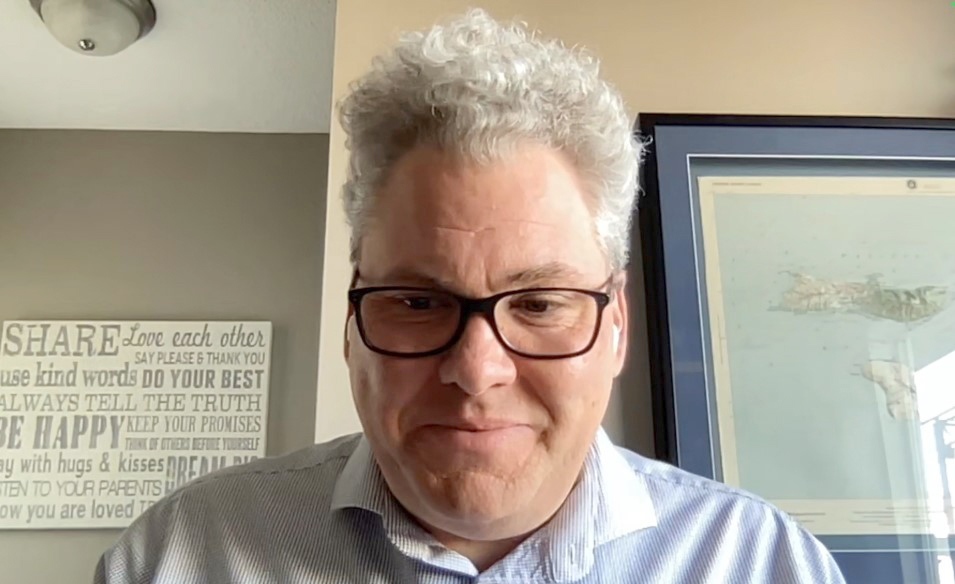No evidence to suggest 'thin blue line' patch used in Canada for white supremacy: Criminologist
A Calgary criminologist says rising tensions between the Calgary Police Commission and members of the city's police service is doing a disservice to all Calgarians.
Dr. Kelly Sundberg, an associate professor in the Department of Economics and Justice at Mount Royal University says the commission’s decision to strip the 'thin blue line' patches from the uniforms of on-duty officers is petty politics.
“I think that there's just a lot of people that are making decisions that are not based on facts,” he said.
“Rather, they're using this as a platform for their own personal agenda and in the process there, they're causing some unnecessary conflict between the women and men who keep Calgary safe, and city hall.”
Last week, Ward 9 Coun. Gian-Carlo Carra -- who also sits on the Calgary police Commission -- blasted officers for wearing the patch.
"What we are asking here is that our police service not wear a known hate symbol whose origins are buried in hateful thoughts and hateful deeds, when they serve the public," said Carra.
"If we have members of the service who think that whatever sense of entitlement they have trumps that, there will be a reckoning."
Those are comments police chief Mark Neufeld believe crossed a line and “incensed” members.
“I believe we saw a reference to the 'thin blue line' being referred to as a known hate symbol with a history of hateful hearts and hateful deeds. Those comments were incendiary,” said Neufeld on Tuesday.
Sundberg says claims made by the commission that the patch represents racism, colonialism and division have no merit.
“What is the basis of this direction? Is it evidence based? Is it informed on fact, or is it driven by rumour or guessing?” said Sundberg.
“That's problematic. If we have the police oversight body making decisions that are not evidence based, that are not fact based, that is a problem.”
 Dr. Kelly Sundberg, an associate professor in the Department of Economics and Justice at Mount Royal University says the commission’s decision to strip the 'thin blue line' patches from the uniforms of on-duty officers is petty politics.
Dr. Kelly Sundberg, an associate professor in the Department of Economics and Justice at Mount Royal University says the commission’s decision to strip the 'thin blue line' patches from the uniforms of on-duty officers is petty politics.
On Wednesday, when asked for an interview, Carra declined, saying “how this proceeds will be determined by the commission as a whole.”
“I’ve clearly said my piece and I need to step back in line and respect the process," he said.
When asked to provide context and evidence for his comments, Carra reverted back to his initial response.
Sundberg says he has yet to find any supporting evidence that the patch is deeply rooted in racist groups in Canada.
“The Calgary Police Service is one of the larger police services who stood and rallied in solidarity with the Black Lives Matter movement,” he said.
“So I think a lot of the frustration comes where you have members of city council, who also sit on the police commission, suggesting that this this 'thin blue line' insignia, with the Canadian flag, represents white supremacy and hate. There's no evidence to that effect.
"I've been trying to find examples where the 'thin blue line' Canadian flag has been used in counter protests in Canada and I haven't been able to find one account.”
Sundberg says disciplining hundreds, if not more than 1,000 officers who decide to defy the direction the police commission gave, will cost Calgary taxpayers dearly, if disciplinary hearings are opened up for each individual officer.
“There could be hundreds, perhaps over 1,000 officers who have engaged in this protest, meaning there would be thousands, if not tens of thousands of investigative hours having to be invested and hearings,” said Sundberg.
“This would take months if not years for this one issue, and it would cost millions of dollars.”
However, Sundberg does say the police service has an obligation to follow the direction of the chief, who receives his orders from the commission.
Michael Adorjan, an associate professor at the University of Calgary's department of sociology believes the commission worked tirelessly on this file.
I do believe the commission looked at this very, very carefully and felt it’s as important enough to say that this is a harmful symbol,” said Adorjan.
“This is a symbol that connects with what we know is linked to, not only overt white supremacy in the United States, and certainly since 2016, exacerbated by the pandemic where we see in the United states explicitly. I don’t know if I would even dismiss the connections in Canada.”
 Michael Adorjan, an associate professor at the University of Calgary's department of sociology believes the Calgary Police Commission worked tirelessly on the issue of 'thin blue line' patches.
Michael Adorjan, an associate professor at the University of Calgary's department of sociology believes the Calgary Police Commission worked tirelessly on the issue of 'thin blue line' patches.
On Tuesday, Neufeld announced he would pause the direction for two weeks to speak with members and the unions involved, who openly told officers to defy the order.
Officers wear the patch for a deeply personal meaning, said Neufeld. It symbolizes to them a reminder of officers killed in the line of duty, including most recently the death of Sgt. Andrew Harnett, in December 2020.
A spokesperson for the Justice Minister Tyler Shandro’s office said the province will not step in to resolve the issue.
“This is a matter to be addressed at the local level by police services and their oversight bodies,” said senior policy advisor Diane Carter.
CTV News has reached out repeatedly to the union representing officers, the Calgary Police Association, but have not received a response.
The police commission is set to meet Wednesday at 3 p.m. Its members, along with Neufeld, are scheduled to address the media around 4:45 p.m.
CTVNews.ca Top Stories

Southern California wildfire destroys many structures; governor declares state of emergency
A wildfire whipped up by extreme winds swept through a Los Angeles hillside dotted with celebrity residences Tuesday, burning homes and forcing the evacuation of tens of thousands of people.
Trump is open to using 'economic force' to acquire Canada; Trudeau responds
Prime Minister Justin Trudeau said 'there isn’t a snowball’s chance in hell that Canada would become part of the United States,' on the same day U.S. president-elect Donald Trump declared that he’s open to using 'economic force' to acquire Canada.
A B.C. mom's real-life nightmare and the search to find her trafficked daughter
A Vancouver island mom shares the story of what happened to her teenaged daughter – and a warning for other parents about sex trafficking.
Liberal leadership hopeful Frank Baylis noncommittal on eliminating consumer carbon tax
Liberal leadership hopeful Frank Baylis says eliminating the consumer carbon tax alone will not 'solve the affordability issue for Canadians.'
Canadian naval vessel shadowed by Chinese war ship in the East China Sea
CTV National News is on board the HMCS Ottawa, embedded with Canadian Navy personnel and currently documenting their work in the East China Sea – a region where China is increasingly flexing its maritime muscle. This is the first of a series of dispatches from the ship.
Patient dies in waiting room at Winnipeg hospital
An investigation is underway after a patient waiting for care died in the waiting room at a Winnipeg hospital Tuesday morning.
Limit coffee-drinking to this time window to lower early death risk, study suggests
Drinking coffee has repeatedly been linked with better heart health and prolonged life. But the benefits of coffee consumption could depend on when you drink it, new research has found.
B.C. 'childbirth activist' charged with manslaughter after newborn's death
A British Columbia woman who was under investigation for offering unauthorized midwifery services is now charged with manslaughter following the death of a newborn baby early last year.
Man who exploded Tesla Cybertruck outside Trump hotel in Las Vegas used generative AI, police say
The highly decorated soldier who exploded a Tesla Cybertruck outside the Trump hotel in Las Vegas used generative AI including ChatGPT to help plan the attack, Las Vegas police said Tuesday.


































